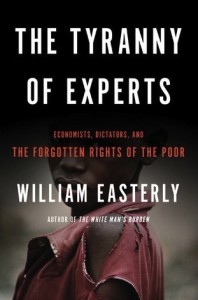EspañolA fundamental cause for the persistence of poverty and underdevelopment is that the rulers of such societies resist the exploration of new ideas. Actually, they stubbornly insist on the continual implementation of those ideas that have failed again and again.

In 2013, William Easterly published The Tyranny of Experts. The central argument of the book is that development programs have ignored the rights of the poor, shown a strong bias towards central planning, and discarded the only alternative that can be effective in the long term: spontaneous order. And that is why they have failed.
In Colombia, instead of discussing this simple yet provocative idea, the government recently launched the “Social Map” (Mapa Social) virtual platform as a tool for fighting poverty. In other words, the government decided to stick with the alternative that only leads to failure.
The key reason for this is that the platform was designed by all the familiar actors involved in the poverty debate, except the most important ones — the poor themselves. Among the institutions involved in its creation were the Department for Social Prosperity (DPS) of the Presidency of the Republic, the Andean Development Corporation (CAF), and Microsoft Corp. Through this platform, users will connect with government agencies, the military, businesses, corporations, and even the academia, but the poor are nowhere to be seen.
Similarly, the prevailing view is that poverty programs have failed because of an insufficient quantity. The platform, therefore, shows key indicators of specific populations, the needs of each region, the kinds of projects that could be developed, and initiatives already in place.
Of course, all these purported needs are defined by the actors who created the platform and the experts who advised them. Apparently, the supposed beneficiaries, the poor, are not worthy to speak for themselves.
This platform, as designed, is a tool that, instead of ending poverty, will tend to perpetuate itself and increase bureaucracy. In an interview with Semana magazine, the director of the Department for Social Prosperity, Gabriel Vallejo, said that besides the monitoring service, the idea is to have government consultants to advise parties interested in carrying out projects. So not only does the platform ignore the rights of the poor to decide on their own affairs, it assumes that employers or philanthropists in Colombia are unable to advance their projects by themselves without government babying along the way.
All this is based on the persistence of misconceptions and clichés about the nature of poverty and, consequently, about how to eliminate it. For example, in the same interview, Vallejo said that “it is proven that Corporate Social Responsibility has a positive impact on the business success of companies.” But the evidence for this claim, of course, is not provided. We are just told that’s the case, and are expected to believe it. And as we make an effort to believe it, we forget that businesses, by their mere existence and satisfy consumers, fulfill their social responsibility.
Against this claim, the reporter asks Vallejo — also from a wrongheaded view — that if that’s the case, then why does poverty persist. Instead of recognizing that poverty is the result of state intervention — the privileges that it gives a few and the protectionist obstacles it imposes on others — Vallejo replied that the problem is that people don’t know how to help, and therefore, that the Social Map solves the problem. Again, without the Colombian state and its virtual platforms, we the citizens would be unable to do anything good for our own benefit or that of others.
To make matters worse, Vallejo — consistent with the long tradition of government officials who wash their hands when faced with important problems — says that while the government is in principle the institution responsible for ending poverty, the particular features of the phenomenon in Colombia make it the responsibility of all. By “responsibility,” Vallejo doesn’t mean, of course, that everyone shall work for the achievement of their interests and goals, satisfying the desires and needs of others in the process. No. He defines “responsibility” as the need to invest in projects according to the priorities identified by his platform.
Finally, both Vallejo and President Juan Manuel Santos presented the platform as something innovative, unique. So they will not only persist with the wrong approaches to social problems, they will feel proud and creative for doing so!
Most poor people do not need charity or “virtual maps” to solve their problems. They also don’t appreciate being forced to participate in a condescending fair where they can be observed and used by philanthropists to satisfy their need to feel they are “better human beings.” As demonstrated by W. Easterly, the poor are willing and able to decide for themselves. All they need is for the state to stop making it so difficult for them to do so.
 Versión Español
Versión Español












